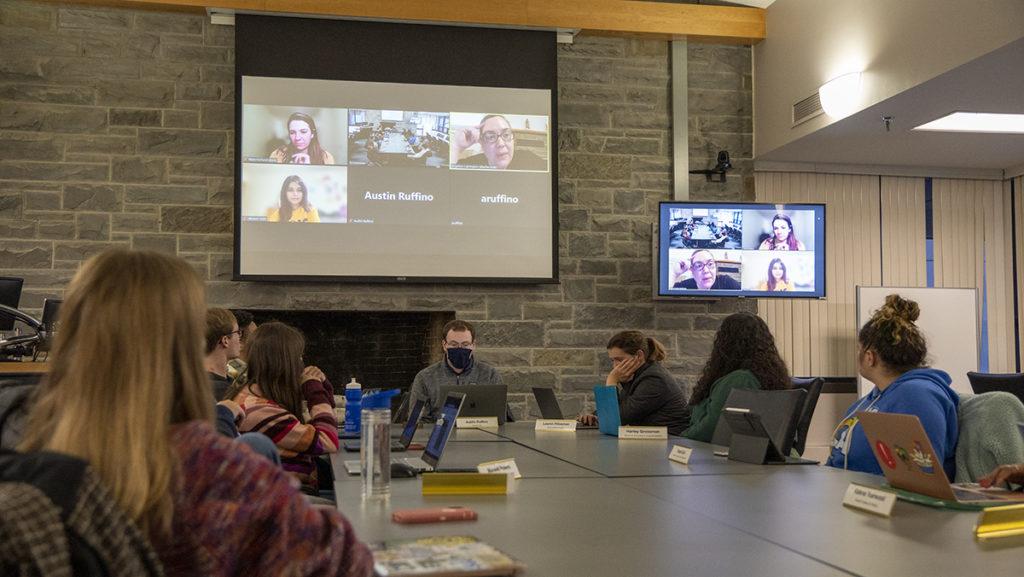Two guest speakers joined the Ithaca College Student Governance Council (SGC) at its March 28 meeting and imparted information about initiatives on campus regarding student advocacy, mental health and housing.
Angélica Carrington, director for the Center for Inclusion, Diversity, Equity, and Social Change (IDEAS), said by providing culturally validating spaces, the center works to empower marginalized students. She said the Center for IDEAS provides educational opportunities as well as additional advocacy and support for students. Dean of Students Bonnie Prunty was the second guest speaker. She discussed housing updates and health and wellness initiatives with the SGC.
The SGC often works to support campus resources and finds ways to increase student accessibility. Junior Senate Chair Austin Ruffino said if students ever come to Carrington looking for funding for campus organizations and programming, the SGC is one resource that can provide monetary support.
“I’m a big advocate for when we do programs to collaborate with student organizations because … it kind of helps attendance, but also it makes sure that the programs that we’re providing actually mirrors what the students want to hear or do,” Carrington said. “If there’s any student orgs that come your way or if any of you have ideas for programs, I’m totally open to that so that we can support each other’s interests and be able to reach different populations on campus.”
Junior Lila Weiser, chief of staff, added onto Ruffino’s interest in aiding the center’s initiatives.
“Besides promoting some of the events you are doing, what are ways SGC can best support your office?” Weiser asked.
After starting at the college in January, Carrington said she is still learning about the campus but that the SGC can help students be aware of the Center for IDEAS and the resources it provides. She said something important that many students do not know is that she and Omega Hollies, associate director for the Center for IDEAS, are both confidential resources, meaning they are not required by law to report incidents to the authorities. Most faculty and staff are mandatory reporters and are responsible for reporting certain crimes and incidents like sexual misconduct and discrimination.
“If there’s a bias incident or a student that experiences an unfortunate event that impacts the way that people want things to be at this institution, please let us know,” Carrington said. “If we start to see a trend among faculty and staff that are not being inclusive … we can try to advise on how to help faculty and staff be more inclusive in their approaches so that our students can have a better experience while they’re here.”
In regard to inclusive education, junior Himadri Seth, international senator, said she has heard from international students that sometimes the way professors teach can be reliant on knowledge students would only know if they grew up in the West.
“A lot of professors kind of forget that there are international students in their classes just because we’re such a small number,” Seth said. “I guess that’s something that I feel would be nice to address, maybe with professors and I am just wondering what is a way to do that.”
Carrington said there is ongoing professional development and curriculum revision by faculty so that it could be something she can suggest to faculty and collaborate with them on.
To improve mental health resources and housing, Prunty explained some of the efforts the college has made and plans to make in the near future.
In partnership with the JED Foundation (JED), the college has identified areas of resources in need of improvement and has begun implementing changes targeted at improving mental health on campus. Prunty said the college has a committee working on making a centralized hub of information about both mental and physical wellness on the college website. Starting next year, Prunty said there will be a tuition insurance option for students and a more clear process for leave of absences and return from absences.
The college is working on a drug collection program as well for people to dispose of prescription or non-prescription drugs they need to dispose of. The pilot for this program will be April 29 to see if this is something the college should have available regularly. Prunty also said JED suggested a residential community aimed at creating a space for students recovering from substance abuse.
One infrastructure change is that the college will be replacing closet rods with breakaway rods to increase student safety in dorm rooms.
Two new residential learning communities (RLCs) have been added to the list of options. One is Open Pages, a transgender and nonbinary living space. The other is the Health and Wellness Community for students who want to live in a space where everyone is committed to healthy living and will have opportunities like yoga nights and education about nutrition.
Freshman Noah Richardson, Class of 2025 senator, said some constituents had brought up the desire for a residential community for people of color on campus and said the request had resonated with him.
“There was one day sitting in the lounge and … I was like I am the only Black person on my floor,” Richardson said. “I live an hour out of New York and it’s a very diverse area so coming here … I do feel as though at some times there is a bit of loneliness that comes with seeing less and less faces that look like you and share the same personalities and cultural interests and stuff like that.”
Prunty said a residential community for people of color is entirely possible, but that if they are created by students there is often increased interest on campus overall.
“Our experience with forming communities is that we are much more successful with the learning communities that grow out of students’ ideas and interest,” Prunty said. “Rather than us just saying, ‘We think this is a really good idea. Let’s have a POC community and we’ll set it up and have a few students sign up.”









